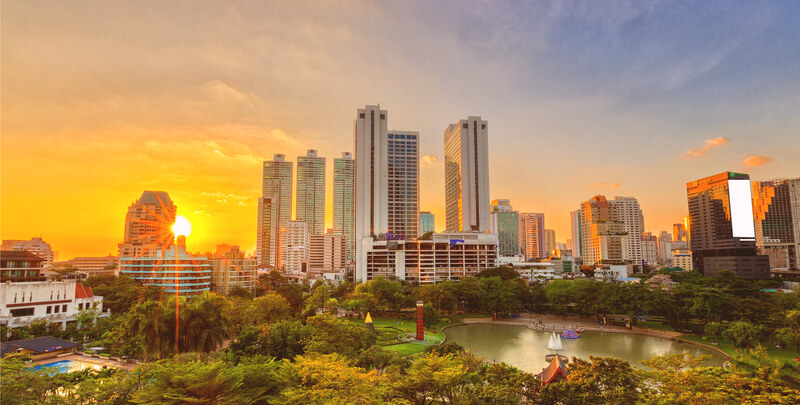Renting in Thailand as an American: Everything you need to know
Thinking about moving to Thailand? Find out what you need to know about renting in Thailand in this guide.

With stunning beaches and a reputation as a friendly, laid back home, the Land of Smiles has become a magnet for retirees looking for a better quality of life. Because the cost of living in Thailand is relatively low, a fixed pension income can go further and offer some luxury alongside the exotic culture and appealing climate.
If you’re thinking of using your retirement to experience a new way of living then Thailand may be the place for you. Check out this guide to see the costs and benefits of retiring in Thailand.
Thailand is an enticing choice not only because of its climate and friendly people, but also due to the affordable cost of living.
In order to get a retirement visa for Thailand, you must prove your income is on average $2000 per month. With average earnings in Thailand around $1000 per month, this minimum requirement should allow for a solid standard of living for retirees looking for a simple life.
Many retirees, however, are looking for a more luxurious lifestyle in their golden years. Imports of wine and foreign food and luxuries such as golf games and foreign travel can quite significantly push up the daily costs of living.
For the best of both worlds, analysts advise retirees to make the most of the goods and services that are relatively cheap locally. By doing this, it's possible to live well on the minimum required for visa compliance - or choose an extremely luxurious life including some housekeeping help and lavish entertainment, for around $5000 a month.
Day-to-day life in Thailand is relatively cheap. However, don’t forget that exchange rates vary over time, and this can impact your disposable income significantly. If you draw your income in a currency other than Thai Baht, then aim to get the best deal on your currency transfers. Do your research, keeping in mind the mid-market rate, and choose a currency exchange service which will give you the most for your money. Wise can be a great service for your transfers as they provide you with the real mid market rate and use local transfers to charge you the lowest fee possible.
Numbeo.com offers insight into how much you should expect to budget by providing average cost of living data. These prices are an average across Thailand, and the actual costs will vary by region and city.
When paired with publicly available calculations from some great expat resources, we can see an example of average living costs for a retired couple below.
####Average price in Thailand (USD)*
| ---| --- |
| City centre apartment rental (3 bedroom) | $1124.94 |
| Utilities (85m2 apartment, including internet) | $75.14 |
| Groceries | $350 |
| Dining out and entertainment (two people, 4 times a week) | $450 |
| Healthcare (dependant on circumstances) | $170 |
| Total basic monthly costs | $2170.08 |
Details from Retireby40.org, TonyinThailand.com, and Numbeo.com, correct as at 1st June 2016
If you intend to retire in Thailand and are over 50 years old, you can apply for an O-A type visa, which allows you to stay for a year with the condition that you don't work. The visa can subsequently be extended subject to further checks and conditions.
To qualify for this retirement visa, you must show evidence of the income or assets you'll live on. The current requirements are that you have a monthly income of at least 65000 Baht (in the region of $2000), or hold assets of at least 800000 Baht (around $25000). You also will be asked to show proof of this income when you apply.
Aside from having money in the bank, you must not have criminal convictions or communicable diseases (you’ll be asked for a medical certificate to prove your fitness), as well as a passport with at least one year's validity and the relevant forms and photos. You can apply for a visa at your local Thai embassy, or at the Immigration Bureau in Bangkok.
Aside from budgeting for everyday expenses, you’ll need to think about the impact of known expenses on your disposable income, such as tax liability and health care.
General levels of healthcare in Thailand are good in the major cities, but in smaller towns or cities it can fall below the standards you might experience in places like Western Europe or North America. Whilst there are both public and private hospitals in Thailand, in some areas there can be a shortage of GPs.
You will be charged for your health care as a retiree in Thailand, and it’s not unheard of for hospitals to turn away patients if they doubt their ability to pay. Although some travellers prefer to rely on savings to pay for health care costs, health insurance is one investment most retirees consider essential. Having adequate cover means that you can seek help when you need it without having to worry about the bill.
Before choosing insurance, it pays to do some research. Your own circumstances will influence the costs and coverage you’ll choose, but there are helpful resources such as this thorough article covering different types of insurance available. The insurance you're offered can vary depending on the length of time you spend outside of your home country. This article gives useful guidance on how to select a policy and evaluate the coverage you need.
Tax for expats is notoriously complex. Make sure you fully understand your liabilities, to avoid nasty surprises.
Tax residency is established if you spend more than 180 days every year in Thailand. If you're considered a tax resident in Thailand you may find yourself subject to local tax on your income or pension, although this liability may be offset if your home country has a tax treaty with Thailand.
As a general rule, you'd only be subject to income tax in Thailand if the income was derived in the current tax year, meaning that money saved prior to retirement may be exempt. Individual circumstances matter, so talking to a professional is advisable.
More retirees are seeking ways to stretch their savings while experiencing something new in later life. And with technology and budget air travel making it easier than ever to maintain connections back home, the appeal of a new life somewhere like Thailand is obvious. With a bit of money in the bank, and some careful research and planning, you could be eating Pad Thai and Crab Cakes in bustling Bangkok before you know it.
*Please see terms of use and product availability for your region or visit Wise fees and pricing for the most up to date pricing and fee information.
This publication is provided for general information purposes and does not constitute legal, tax or other professional advice from Wise Payments Limited or its subsidiaries and its affiliates, and it is not intended as a substitute for obtaining advice from a financial advisor or any other professional.
We make no representations, warranties or guarantees, whether expressed or implied, that the content in the publication is accurate, complete or up to date.

Thinking about moving to Thailand? Find out what you need to know about renting in Thailand in this guide.

For many westerners, holidays in Thailand can be difficult to keep track of, since many of them change dates yearly depending on the lunar calendar....

With its white sandy beaches and warm weather every day, Thailand embodies a tropical paradise. It’s a popular destination for tourists and expats looking for...

One important decision, if you’re moving to Thailand with family, is how to ensure that your children have the best possible education. The Thai state system...

You’re probably tempted to retire in Thailand, whether you’re a Brit, an American or an Australian. Between the amazing food, the pristine beaches and the...

Expats have long been attracted to life in Thailand, where the climate is great, the people are friendly and the culture is exotic. The relatively low costs...